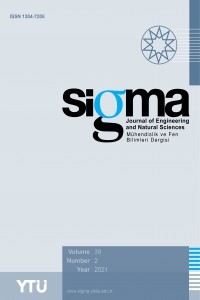EXPERIMENTAL INVESTIGATION OF EVAPORATION FROM A HORIZONTAL FREE WATER SURFACE
The aim of this work is to investigate of the evaporation from a horizontal free water surface under forced and free convection conditions. Experimental results were obtained in an installation consisting of a low speed wind tunnel and an evaporation tank. The status of free convection was provided at different temperature and relative humidity values of the ambient air. By changing the DC fan voltage, forced convection was ensured. Flows with Reynolds numbers varying between 6274 and 12667 were considered. Using the full factorial design which is a kind of design of experiment, relationship between evaporation rate and affecting parameters such as air flow velocity, air temperature and relative humidity were examined. Finally, an empirical correlation was derived by the experimental results. To validate the mathematical model were compared experimental measurements for the mass transfer at the free water surface and with available correlations in literature.
Evaporation rates calculated with obtained empirical correlation were compared with the values obtained by experimental results, it is observed that the calculated evaporation rates are within an error band of ±20%. The experimental results compared to the available correlations individually, a better level of agreement was obtained.
Keywords:
Water evaporation rate, free surface, heat and mass transfer, forced convection free convection, wind tunnel measurements.,
___
- [1] Asdrubali, F., (2009). A scale model to evaluate water evaporation from indoor swimming pools, Energy and Buildings 41, 311-319.
- [2] R. Tang, Y. Etzion, Comparative studies on the water evaporation rate from a wetted surface and that from a free water surface, Building and Environment 39 (2004) 77-86.
- [3] W. H. Carrier, The temperature of evaporation, ASHVE Transactions 24 (1918) 25-50.
- [4] ASHRAE. ASHRAE Handbook - HVAC Applications, Atlanta, GA, 2007.
- [5] Smith, C. C., Lof G., Jones, R., (1994). Measurement and analysis of evaporation from an inactive outdoor swmming pool, Solar Energy 53-1, 3-7.
- [6] Himus, G. W., Hincley, J. W., (1924). The effect of a current air on the rate of evaporation of water below the boiling point, Journal of the Society of Chemical Industry 43-34, 840-845.
- [7] Rowher, C., (1931). Evaporation from free water surface, US Department of Agriculture in Cooperation with Colorado Agricultural Experiment Station, Technical Bulletin 271.
- [8] Pauken, M. T., (1999). An experimental investigation of combined turbulent free and forced evaporation, Experimental Thermal and Fluid Science 18, 334-340.
- [9] Sartori, E., (2000). A critical review on equations employed for the calculation of the evaporation rate from free water surfaces, Solar Energy 68, 77-89.
- [10] Raimundo, M. A., Gaspar, R. A., Oliviera, A. V., Quintela, A. D., (2014). Wind tunnel measurements and numerical simulations of water evaporation in forced convection airflow, International Journal of Thermal Sciences 86, 28-40.
- [11] Marek, R., Straub, J., (2001). Analysis of the evaporation coefficient and the condensation coefficient of water, International Journal of Heat and Mass Transfer 44, 39–53.
- [12] Kline, S. J., and F. A. McClintock, (1953). Describing Uncertainties in Single-Sample Experiments, Mechanical Engineering, Vol. 75, No. 1, 3-8.
- [13] Minitab Statistical Software User Guide for Release 17.3.0..
- ISSN: 1304-7191
- Yayın Aralığı: Yılda 4 Sayı
- Yayıncı: Yıldız Teknik Üniversitesi
Sayıdaki Diğer Makaleler
Rasoul DANESHFARAZ, Hojjat SADEGHI, Ali REZAZADEH JOUDI, John ABRAHAM
Aslı ÇOBAN, Cengiz KAYA, Eyüp DEBİK, Gül KAYKIOĞLU
Fatma AYTAN KILIÇARSLAN, İbrahim ERDEN
Seyed Mostafa MOUSAVI, Navvab SHAFIEI, Abdolrahman DADVAND
Huceste ÇATALGİL GİZ, Sevim İŞÇİ, Fatemeh BAHADORİ, Zeynep KALAYCIOĞLU, Barbaros AKKURT
